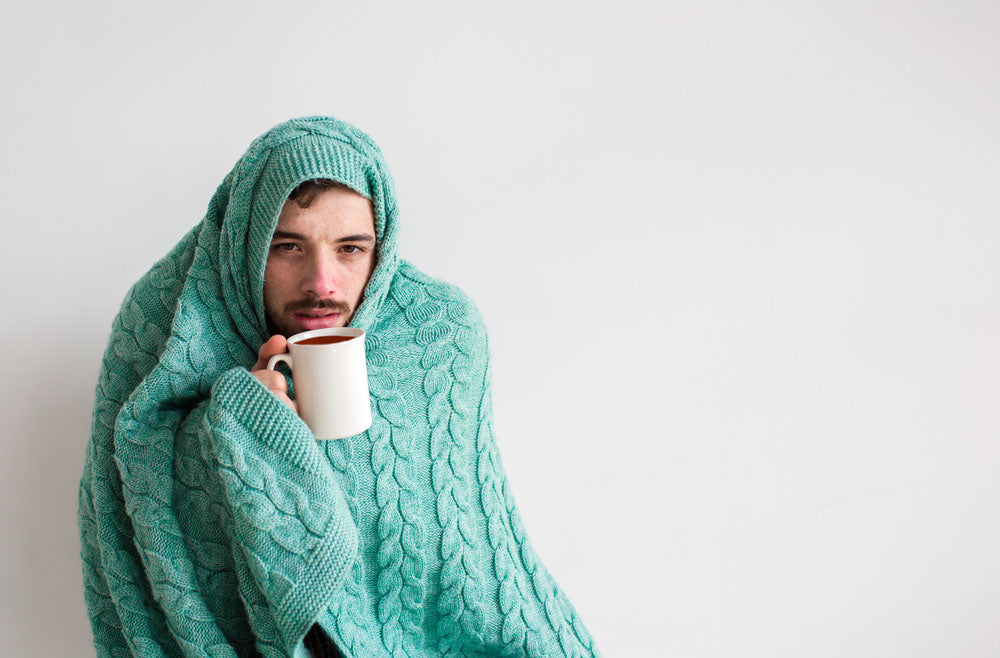
How to Stay Hydrated When Sick
Share
Source: Estrada Anton/Shutterstock.com
We've all been there before. We start feeling under the weather, and our first instinct is to drink lots of fluids. After all, when we're sick, we're often told to drink more fluids to stay hydrated. But have you ever stopped to wonder why that is? Why do we need to be extra careful about staying hydrated when we're sick?
We'll take a closer look at the connection between dehydration and illness and what you can do to avoid dehydration when you're not feeling your best.
Why Do We Get Dehydrated While Sick?
1. Fever
You naturally sweat more when your body temperature rises due to a fever. This increased sweating can lead to dehydration if you're not replenishing your body with enough fluids. Therefore, staying hydrated is essential if your fever persists.
2. Vomiting and Diarrhea
If you've been battling a stomach virus, chances are you've also been dealing with nausea and vomiting. Unfortunately, these two symptoms can quickly lead to dehydration since they cause your body to lose a lot of fluid fast. Diarrhea contributes to dehydration as it causes your body to expel water and electrolytes that need to be replaced.
Add Electrolyte Pills to Your Self-Care Routine3. Sinus Infections
The connection between sinus issues and dehydration is well-documented. Dehydration can both be the cause of and caused by sinus infections. When you have a stuffy nose, your body uses fluids to create the mucus that helps to flush out your sinuses. And if you're not replenishing these lost fluids, it can worsen the infection by thickening the mucus and making it harder for your body to get rid of it. This kind of blockage creates pressure and causes headaches and sinus pain.

Source: Ground Picture/Shutterstock.com
4. Lack of Fluids
This might seem like a no-brainer, but it's worth mentioning. One of the main reasons people become dehydrated while sick is not drinking enough fluids and not consuming enough water-rich foods. When you don't feel well, it's easy to lose your appetite and not feel thirsty. But it's important to push through and ensure you're getting the fluids your body needs.
5. Medications
Certain medications can also cause dehydration. For example, diuretics help to expel fluids from your body and can lead to dehydration if you're not careful. Other medications that may have this effect include blood pressure medications and laxatives. If you're taking any of these medications, drink plenty of fluids and talk to your doctor or pharmacist about the best way to stay hydrated.
Ways to Prevent Dehydration When Sick
1. Drink Plenty of Fluids
This is obvious, but it's worth repeating: drink plenty of fluids when you're sick! The best way to avoid dehydration is to consistently and steadily consume fluids. Don't gulp back two gallons of water in the morning and think you're good for the rest of the day. Instead, try to sip fluids throughout the day, and keep a water bottle or glass of water with you so you can drink.
2. Drink Fluids That Contain Electrolytes
You also lose electrolytes like sodium and potassium when you're losing fluids due to vomiting, diarrhea, or sweating. That's why it's essential to drink liquids that contain these electrolytes. An easy way to do this healthily and avoid the added sugar of many sports drinks is to mix electrolyte powder with water. Alternatively, you can also use a capsule supplement like electrolyte pills which ensure you're getting a balanced mix of electrolytes.
3. Drink Warm Fluids
Drinking warm fluids can help to soothe a sore throat and open up congested sinuses. And the bonus is they help you stay hydrated! Try sipping on warm soup, bone broth, or herbal tea throughout the day. On that last note, many teas can help with various illnesses. For example, ginger or peppermint for upset stomachs, turmeric for combating inflammation, and chamomile to help relax and get some much-needed rest.
Prevent Dehydration with Electrolyte Powder4. Eat Water-Rich Foods
In addition to drinking fluids, ensure you're also consuming water-rich foods like fruits and vegetables. These foods will help keep you hydrated and provide essential vitamins and minerals that can help boost your immune system. Some good options include watermelon, cucumber, tomatoes, leafy greens, and oranges. You can also have yogurt and smoothies if you want something more filling.

Source: KucherAV/Shutterstock.com
5. Avoid Caffeine and Alcohol
Caffeine and alcohol are diuretics, making you urinate more and can lead to dehydration. Additionally, alcohol also harms the immune system, so it's best to avoid it when you're sick. If you need a pick-me-up, opt for decaffeinated coffee or tea instead.
6. Check Your Urine Color
One easy way to tell if you're dehydrated is to check your urine color. You need to drink more fluids if it's dark yellow or amber. It would be best if you aimed for clear or light yellow urine, which indicates that you're well-hydrated.
7. Seek Help When Necessary
If you're feeling especially ill or suffering severe effects of dehydration, such as fainting or seizures, it's important to seek medical help. Dehydration can be dangerous, so don't hesitate to call your doctor or go to the emergency room if you feel very dehydrated.
Keep It Simple
When you're sick, it's wise to keep things simple. Drink plenty of fluids and eat water-rich foods to stay hydrated. Get lots of rest so your body can fight off the illness. And avoid caffeine and alcohol, which can dehydrate you. And don't forget to add some keto electrolyte powder if you're suffering from the keto flu or another electrolyte imbalance. By following these tips, you'll be on your way to recovery in no time!
